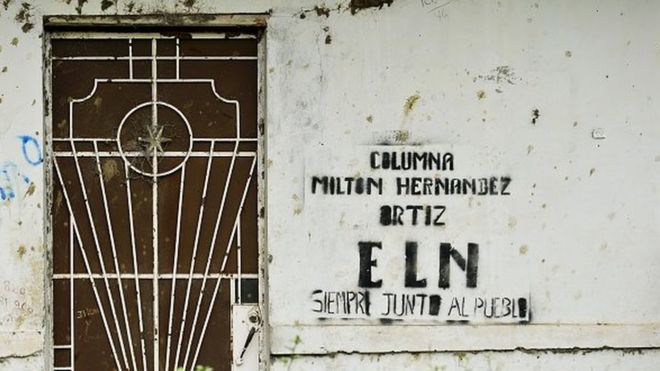Colombia ELN: Government and rebels to hold peace talks

Colombia has announced it is starting formal peace talks with the country's second largest rebel group, the National Liberation Army (ELN).
Government and ELN negotiators made the announcement in the Venezuelan capital, Caracas, where the two sides have been holding informal talks.
The two sides have been engaged in a five-decade-long conflict.
The announcement came as the government is nearing a final peace deal with Colombia's largest rebel group, Farc.
An estimated 220,000 people have died in Colombia in violence between the security forces, left-wing rebels and right-wing paramilitary groups since the conflict began in 1964.
Founded in 1964 as a Marxist guerrilla group to fight Colombia's unequal distribution of land and riches
Estimated to have some 2,000 active fighters
Strongholds in the provinces of Arauca, Narino and Norte de Santander
Financed by extortion, drug trafficking and kidnappings for ransom
The ELN and the government have been holding exploratory talks for more than two years in Ecuador and Venezuela.
However, a number of ELN attacks and kidnappings have until now thwarted progress.
At the beginning of February, Colombian government negotiator Frank Pearl warned the rebel group that "their time to reach a political solution to the armed conflict in Colombia is running out".
In the past weeks, the ELN released two of the hostages it was holding, paving the way for the announcement.
On Wednesday, the two sides said they had agreed on a six-point agenda for the formal peace talks which will be held in the Ecuadorean capital, Quito.
The issues to be discussed include how the rebels will lay down their arms and how they can take part in Colombian politics once a peace deal has been reached.
The ELN was founded in 1964 and inspired by the Cuban revolution of 1959.
One of its co-founders was the Jesuit priest Camilo Torres.
Torres was a follower of liberation theology, a radical movement within the Catholic Church especially popular in Latin America, where it emerged in response to widespread poverty and ill-treatment of ordinary people.
After Torres was killed in clashes with the Colombian security forces in 1966, Manuel Perez, a former Spanish priest, took over the group's leadership.
He died of natural causes in 1998. Since then, the ELN has been led by Nicolas Rodriguez Bautista, better known by his alias, Gabino.
Some of the most violent attacks by the ELN happened in the late 1990s.
In October 1998, 84 people were killed when the ELN blew up an oil pipeline in Antioquia province.
The group has also kidnapped and ambushed members of the security forces and local businessmen.
Last year, 11 soldiers and a policeman were killed in an ambush as they were transporting ballot boxes following local elections.
Политика конфиденциальности | Правила пользования сайтом










